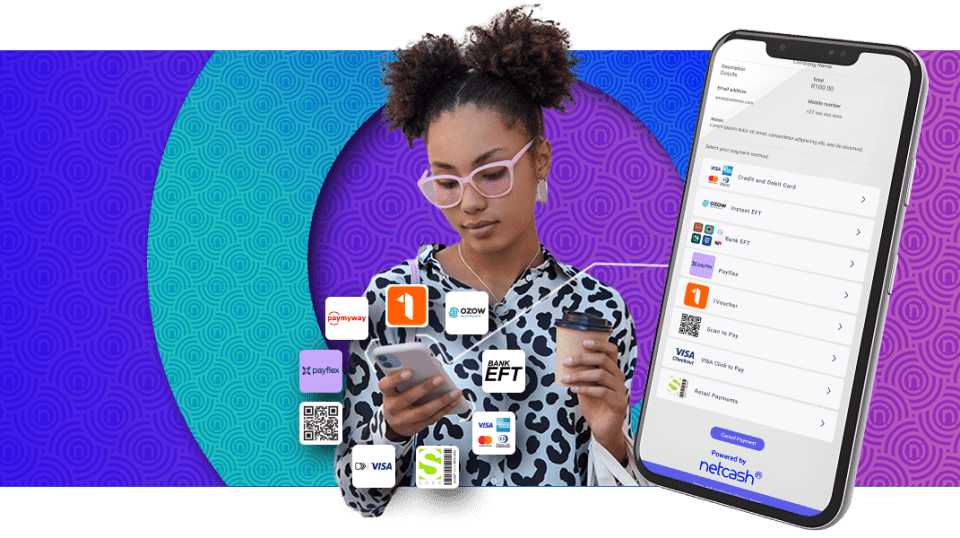
The benefits of integrating your software with the Netcash API
December 13, 2024
The difference between Debit orders and Stop orders
January 28, 2025South Africa’s payment industry is gradually evolving. The transition from traditional cash transactions to digital alternatives has intensified over time. While digital payments are becoming increasingly popular, cash remains a dominant force in many sectors of the economy. This combination of old and new is influencing the future of how South Africans make payments.
From mobile wallets to vouchers and payment gateways for small businesses, the landscape is becoming more diverse, creating opportunities for innovation and inclusion. It’s essential to understand the factors driving this evolution, the challenges businesses and consumers face, and the emerging trends shaping the future of payments in South Africa.
If you’re curious about how South Africans make everyday payments and what the future holds — buckle up. This is an in-depth look at the country’s traditional and digital payment systems. We’ll go over the benefits and drawbacks, as well as potential opportunities and challenges.

South Africa’s payments industry overview
Before we get into the nitty-gritty, let’s unpack the current state of payments in South Africa. While digital payment services have grown in popularity, particularly in urban areas, cash has long been king in South Africa, especially in rural and informal sectors.
So, is cash still king?
Many people still prefer to handle physical currency, whether for day-to-day purchases or for sending money to family members. According to the recent South African Reserve Bank Payments Study Report, over 80% of South Africans still use cash for everyday transactions.
This shows that, despite digital developments, cash remains firmly rooted in the local economy. For smaller enterprises, it remains a straightforward and familiar payment method. There is no need for costly equipment or internet connectivity. This makes it a desirable choice for many people, particularly in locations with limited access to financial infrastructure.
Rise of digital payment platforms
South Africa is witnessing a steady rise in digital payment platforms thanks to how services like PayShap have revolutionised the way individuals and businesses send and receive money.
These services encourage financial inclusion by allowing users to transfer money quickly and easily, allowing people who do not have access to traditional banking services to engage in the digital economy. Mobile payment options are also a major game changer in the industry.
Mobile wallets and Scan to Pay apps, like SnapScan and Zapper, have made it easier for consumers to make payments using their smartphones. This trend is not only seen in cities but also in rural areas, where mobile technology is often more accessible than conventional banking.
Emergence of voucher payments
Voucher payments are also playing a critical role in bridging the gap between established and digital payment methods. Voucher systems allow consumers to make payments virtually without needing a bank account or credit card.
Vouchers can be used for almost everything from shopping online to paying bills. This hybrid method, which combines cash and electronic payments, is especially important in South Africa, where many people still lack access to banking but are adopting digital solutions.

Coexistence of traditional and digital payment methods
From the overview above, you can see that the payments ecosystem in South Africa is quite diverse. The use of one payment system over the other is purely preference-based, resulting in a harmonious coexistence between traditional and digital payment methods.
Cash remains the preferred payment method for many South Africans, making up 56% of payments. This is due to several reasons. For one, it’s simple and immediate. There are no fees or bank charges associated with cash transactions, and it doesn’t require an internet connection or access to a smartphone. Money being a primary form of income is another reason.
For those living in remote areas with limited connectivity, money is still the most reliable form of payment. Nonetheless, voucher payments strike the ideal balance between traditional and digital payment methods. They allow consumers to enjoy the ease and speed of digital payments while still having access to cold hard cash or paying with physical vouchers.
How businesses and consumers are adapting to dual systems
The coexistence of money and digital payments requires businesses to adapt quickly. Small businesses are increasingly integrating with payment gateways that support multiple payment methods. This flexibility ensures they can cater to customers from all walks of life — those who prefer to pay with cash and those who want the ease of making electronic payments.
Consumers, too, are adapting. As digital wallets and payment apps become increasingly user-friendly, more individuals choose the convenience of paying with their cell phones. However, the transition is not without its problems. The digital divide remains a major issue in South Africa, with many people still missing the necessary tools or skills to use digital payments.

Emerging trends and the future of payment technology
South Africa is at the forefront of several industry-changing developments, including mobile payments and blockchain technology. As digital payment acceptance grows, businesses and FinTech startups are looking for innovative methods to make transactions faster, safer, and more convenient.
For example, South African payment gateways are incorporating advanced security measures, such as two-factor authentication and encryption, to protect users from fraud. Netcash is leading in this regard, providing businesses with fraud prevention mechanisms such as DebiCheck.
Let’s take a closer look at two growing payments industry trends and how they could affect you:
Mobile wallets
Mobile wallets are becoming an increasingly important tool for consumers and companies. Users can make secure payments with their phones using apps like Google Pay and Apple Pay, as well as local solutions like Zapper and SnapScan. These apps are useful not only for shopping but also for sending money and paying for services like utilities and transportation.
Real-time payment platforms, such as PayShap, are also transforming the way payments are made. These platforms allow users to send and receive money instantly, making transactions faster and more efficient. This shift is significant in South Africa, where the speed of traditional bank transfers can be a barrier to financial inclusion — say goodbye to “up to 2 working days”.
Blockchain and cryptocurrencies
While still in its early phases, blockchain technology and cryptocurrencies have the potential to revolutionise South African financial systems. Blockchain provides a secure and transparent means to conduct transactions without the need for intermediaries. This could result in lower expenses, faster payments, and more security.
Cryptocurrencies like Bitcoin and Ethereum are also gaining traction, but they still face challenges in terms of mainstream adoption. Issues such as regulatory uncertainty, volatility, and a lack of understanding among the general public have slowed their growth.
But, with increasing interest from businesses and consumers, it’s possible that cryptocurrencies will play a larger role in the South African payment processing industry in the years to come.

Role of voucher payments in a digital future
South Africa’s digital divide may exacerbate the country's already severe inequality. That is why the rise of instant payment transactions is so important. Voucher payments are essential for fostering financial inclusion, especially among the unbanked. In South Africa, many people do not have access to traditional banking services but must conduct digital transactions.
Voucher systems allow them to participate in the digital economy without the need for a bank account or credit card. This flexibility is vital in a country where many people are excluded from the formal financial system. 1Voucher is easily available at Shoprite, PEP, and on Flash.
By combining voucher payments with digital platforms, company owners may reach a bigger audience. This technique not only serves to bring more people into the digital economy but it also promotes the use of other digital payment methods.
How digital platforms are enhancing voucher systems
Digital platforms are playing a key role in enhancing the functionality of voucher payments in South Africa. For example, some platforms like eGifts24 and Prepaid24 allow users to buy vouchers digitally and use them for both online and in-store purchases.
This system provides the convenience of digital transactions while maintaining the accessibility of vouchers. It’s a model that’s gaining traction in South Africa, where access to the internet is slowly improving. The biggest hurdle for purchasing vouchers online is the cost of internet data.

Challenges and opportunities in South Africa’s payment evolution
Despite the rise of digital payments, difficulties persist. Connectivity concerns remain pervasive, particularly in rural regions with limited internet access. Beyond this, many South Africans are unfamiliar with these systems, which may provide a hurdle to adoption.
Trust is another big difficulty. While digital payments are convenient, some consumers remain concerned about online fraud or scams. To address these challenges, businesses must educate their clients and provide secure, reliable payment solutions.
Let’s unpack how businesses can take advantage of opportunities in this evolution:
FinTech to drive innovation and inclusion
FinTech companies have a unique potential to promote innovation and expand financial inclusion in South Africa. These companies can assist in bridging the digital divide by offering user-friendly payment systems that appeal to both the unbanked and the tech-savvy.
Integrations with payment gateways such as Netcash enable small businesses to accept a variety of payment methods, including card payments and mobile wallets. This flexibility will increase the use of digital payments and allow firms to access a bigger client base.
Regulations shaping the future of payments
South Africa’s regulatory environment is also evolving to support the growth of digital payments. The government has introduced public-private FinTech policies that aim to enhance financial inclusion, improve the security of digital transactions, and encourage innovation in the sector.
These regulations will continue to shape the future of payments, ensuring that digital payment solutions are accessible, secure, and sustainable.
The future of payments in South Africa
South Africa’s digital payment adoption is expected to increase over the next decade. With the ongoing advancement of mobile technology and fintech advances, digital payments will become more prevalent in everyday life. Traditional cash payments are expected to dwindle over time, although they will coexist with digital payment methods for the foreseeable future.
Collaboration will be critical to creating the future of payment processing. Working together, the government, banks, and FinTech startups can build a smooth, inclusive, and safe payment ecosystem for all South Africans. This inclusivity will benefit all citizens, regardless of income or geographic location.
The ultimate goal is to create a payment ecosystem that provides all South Africans with secure, efficient, and inclusive payment solutions. By combining the best of traditional and digital technologies, South Africa can build a more strong and egalitarian financial system in the future.

FAQs about the future of electronic payment system
Still have some lingering questions? Here are a few short answers to the most commonly asked questions regarding the future of payments in South Africa.
Wrapping up the future of payments in South Africa
South Africa’s payment ecosystem is on an interesting trajectory. As traditional and digital systems coexist, the emphasis remains on closing gaps, promoting inclusiveness, and encouraging innovation. Platforms like Netcash are enabling small businesses to survive in this ever-changing ecosystem, while services like PayShap provide convenience for regular customers.
Governments, financial institutions, and FinTech startups must work together to shape the future. South Africa is well-positioned to develop a seamless, inclusive, and digitally ready payment ecosystem by tackling issues and capitalising on possibilities.
Ready to embrace the future of payments?
Whether you’re looking to integrate digital wallets, vouchers, or mobile payment systems, we’ve got you covered.

Candice Sergeant is a digital dynamo at Netcash, where she’s on a mission to help South African businesses level up their online game. As an eCommerce Product Owner, she’s got her finger on the pulse of the latest trends and technologies, constantly seeking out ways to boost sales and streamline operations. With a knack for spotting opportunities and a passion for innovation, Candice is your go-to guide for taking your e-commerce business to the next level.



